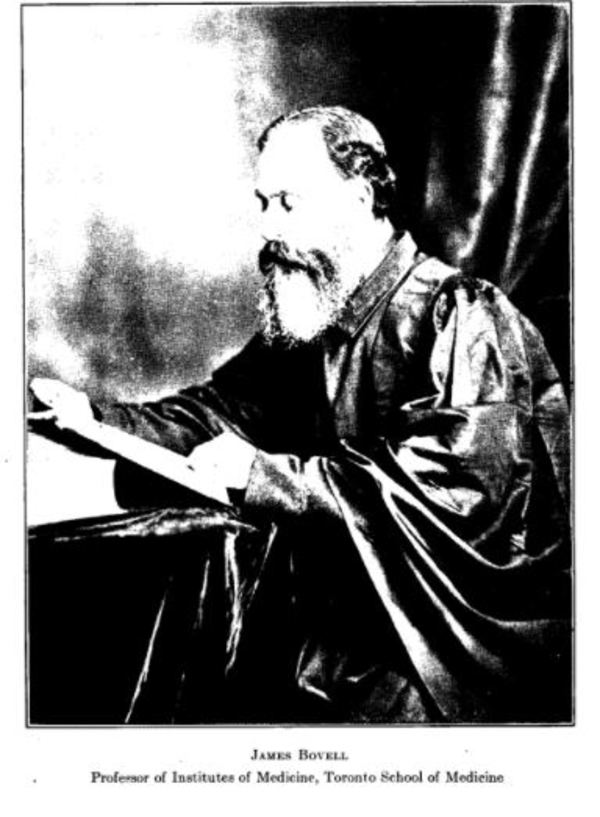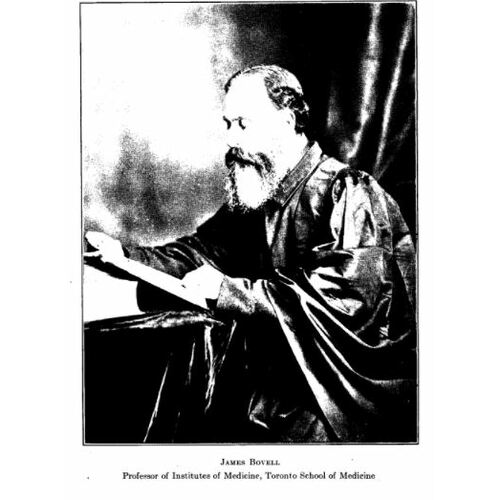
Source: Link
BOVELL, JAMES, physician, Church of England clergyman, theologian, and educator; b. 28 Oct. 1817, in Barbados, West Indies, eldest son of John Bovell, a wealthy banker, and Sarah Applewaite; m. at age 18 Julia Howard App-Griffith of Barbados who survived him by 11 years; of their six children, two died in infancy; d. 15 Jan. 1880, at Charlestown, Nevis, West Indies.
James Bovell received private schooling in Barbados, before going to England at age 17 for further education. He decided to study medicine, and in November 1834 entered Guy’s Hospital, London, where he was Sir Astley Cooper’s dresser, and was taught by Richard Bright, Thomas Addison, and other distinguished physicians. He later studied pathology at Edinburgh and Glasgow while awaiting admittance into the Royal College of Physicians of London as an extra-licentiate in 1839. He then worked for a few years under Robert Graves and William Stokes in Dublin, until stricken with typhus fever. When he recovered, he returned to Barbados and took up practice in Bridgetown. Bovell has been credited with medical degrees from London, Edinburgh, Glasgow, and Dublin universities, but official records do not confirm these additional qualifications.
In 1848 Bovell emigrated to Canada and began practising in Toronto, where he became one of the most prominent physicians. His broad training and questing spirit engaged him in such ventures as the treatment of cholera victims with milk transfusions, the practice of clinical microscopy, and the study of comparative pathology. In 1851 he was co-founder and editor of the Upper Canada Journal of Medical, Surgical and Physical Science (Toronto), and his personal contributions to medical journals totalled nearly 30 papers, on topics ranging from the anatomy of the leech to a uterine tumour as a complication of parturition. His writings often displayed both a reforming zeal and keen observation. He connected the unhealthiness of Barbados with “innumerable swarms of insects” (1848); and advocated health committees for Toronto that should order “the removal of all nuisances and filth,” since “cholera delights in filth and moisture.” Later, in A plea for inebriate asylums, he deplored the general indifference towards drunkenness, which led “the unfortunate victim to look on his state rather as a weak fault or excusable failing than a great sin, and so perpetuat[ed] a degrading vice to his utter destruction and eternal ruin.”
Bovell was a dedicated educationist and was one of the original councillors of the Canadian Institute in 1852. He, along with Edward Mulberry Hodder and four other colleagues, helped to organize the medical faculty of the new Trinity College in November 1850. He was dean from 1851 until 1856, when the faculty resigned and the school was dissolved following disputes with the council, headed by John Strachan*, bishop of Toronto. Friction arose initially because the faculty, whose services were freely given, resented the council’s restrictions on expenditures and its exercise of authority over such matters as the advertisements for medical courses inserted in the press by the dean. The final break came after the faculty opened direct negotiations with the government to forestall a threatened reinstitution of the former King’s College medical school. When Bovell’s conciliatory efforts failed, he joined the Toronto School of Medicine as lecturer in physiology and pathology. In 1864 he also became lecturer in physiology to the Upper Canada Veterinary School (later the Ontario Veterinary College), established in 1862 by Andrew Smith*.
From 1857 until he left Canada in 1870, Bovell was at various times designated professor of physiology, of physiology and chemistry, and of natural theology in the faculty of arts at Trinity College. For several years he was also lay secretary to the diocesan and provincial synods. He was deeply religious and published about a dozen devotional or exegetical works presenting High Church beliefs. His physiology lectures to third year arts students were based on his Outlines of natural theology, which illustrated divine goodness and wisdom through natural objects and phenomena and sought to reconcile recent geological discoveries with the Book of Genesis. Rejecting the doctrines of Sir Charles Lyell and Charles Darwin, he espoused the high sacramental teachings of John Keble and Edward Bouverie Pusey, leaders of the Tractarian movement at Oxford. In 1860, his views on the real presence of Christ in the Eucharist were denounced as “Romish” by the bishop of Huron, Benjamin Cronyn, whose evangelical convictions had involved him in open conflict with Trinity College authorities. To Bovell’s distress, a commentary on his privately circulated denial of this allegation appeared in the Globe newspaper on 15 Nov. 1860. When the corporation of Trinity College (of which he was a member) disavowed and repudiated his doctrinal statements in absentia, he resigned his cherished chair, but Bishop Strachan persuaded him to retain it.
James Bovell strongly influenced William Osler*. In 1866, when Osler, at 17, was head prefect at Trinity College School, the founder and warden of the school, William Arthur Johnson, was Bovell’s close friend and fellow-microscopist, and Bovell was himself medical superintendent and a governor of the school. Osler accompanied the two men on specimen-hunting expeditions, from which stemmed his deep interest in microscopy. When Osler decided upon a medical career, he became Bovell’s unofficial apprentice, and between 1868 and 1870 frequented his house, attended his lectures, browsed in his library, and shared his hobbies, from natural history to the classics. Many years later, when Sir William Osler was Regius professor of medicine at Oxford, he publicly acknowledged owing his start in the profession to James Bovell. On a previous occasion, paying a “tribute of filial affection” to his old teacher, Osler summed him up in these words: “Only men of a certain metal rise superior to their surroundings, and while Dr. Bovell had that all-important combination of boundless ambition with energy and industry, he had that fatal quality of diffuseness, in which even genius is strangled.”
When Bovell revisited the West Indies in 1870, he was persuaded to take holy orders by Bishop W. W. Jackson of Antigua, who ordained him in 1871, and he decided to remain in the West Indies. After serving as curate, then rector, at the united parishes of St George’s and St John’s, Nevis, he moved to Charlestown in 1873, where he took charge of the less demanding combined parishes of St Thomas’ and St Paul’s. In 1875 his health began to fail and he died five years later following a stroke.
Selected writings by James Bovell are: “Apparatus for the exhibition of vapour,” Upper Canada Journal of Medical, Surgical and Physical Science (Toronto), I (1851–52), 59–60; “Clinical remarks on two cases of tumour of the uterus complicating parturition,” British American Journal of Medical and Physical Science (Montreal), V (1849–50), 1–5, 29–32; Constitution and canons of the Synod of the Diocese of Toronto, with explanatory notes and comments (Toronto, 1858); Defence of doctrinal statements, addressed to the right rev. the lord bishop of Toronto, the right rev. the lord bishop of Huron, and the Corporation of Trinity College, with the hope that the explanations now given may remove erroneous impressions, and satisfy the church at large that I am loyal and true to her (Toronto, 1860); Letters, addressed to the Rev. Mr. Fletcher and others, framers of a series of resolutions on “ritual” (Toronto, 1867); “Note on the preservation of some infusoria with a view to the display of their cilia,” Canadian Journal, new ser., VIII (1863), 341–42; “Notes on some points in the anatomy of the leech,” Canadian Journal, new ser., I (1856), 27–33; “Observations on the climate of Barbadoes and its influence on disease: together with remarks on angioleucitis or Barbadoes leg,” British American Journal of Medical and Physical Science (Montreal), IV (1848–49), 113–16, 141–45, 169–72, 197–201, 225–28, 261–66; “On the transfusion of milk, as practised in cholera, at the cholera sheds, Toronto, July, 1854,” Canadian Journal, III (1854–55), 188–92; “On the white globules of the blood in disease,” Upper Canada Journal of Medical, Surgical and Physical Science (Toronto), II (1852–53), 48–50, 65–69, 128–37, 150–56, 182–89, 210–14; Outlines of natural theology for the Canadian student, selected and arranged from the most authentic sources (Toronto, 1859); Passing thoughts on man’s relation to God and on God’s relation to man (Toronto, 1862); A plea for inebriate asylums; commended to the consideration of the legislators of the province of Canada (Toronto, 1862); Preparation for the Christian sacrifice, or holy communion (Toronto, 1859); The world at the advent of Jesus Christ (Toronto, 1868).
Bishop of Antigua’s Lodge, Bishop’s diary, visitation of Nevis, 1872. PAO, Strachan letter books, 1854–62, John Strachan to James Bovell, 29 Nov. 1860. St. George’s, St. John’s, St Paul’s, and St Thomas’ Churches (Nevis, W.I.), Baptism, marriage, and burial registers. Globe (Toronto), 15, 17 Nov. 1860. [William Osler], “James Bovell, M.D.,” Canadian Journal of Medical Science (Toronto), V (April 1880), 114–15. University of Trinity College (Toronto), Calendars, 1853–70. Standard dict. of Can. biog. (Roberts and Tunnell), II, 40–42. Canniff, Medical profession in Upper Canada, 257–58. Harvey Cushing, The life of Sir William Osler (2v. Oxford, 1925). A history of the University of Trinity College, Toronto, 1852–1952, ed. T. A. Reed (Toronto, 1952). C. E. Dolman, “The Reverend James Bovell, M.D., 1817–1880,” in Pioneers of Canadian science, ed. G. F. G. Stanley (Royal Society of Canada “Studia Varia” series, IX, Toronto, 1966), 81–100, 136–46. N. B. Gwyn, “Details connected with the evolution of medical education in Toronto,” University of Toronto Medical Journal, VIII (1930), 224–29; “The early life of Sir William Osler,” International Association of Medical Museums, Bulletin IX, and Journal of Technical Methods (Montreal, 1926), 109–49. A. J. Johnson, “The founder of the medical faculty, Dr. James Bovell,” Trinity University Review (Toronto), XV (1902), 104–6.
Cite This Article
Claude E. Dolman, “BOVELL, JAMES,” in Dictionary of Canadian Biography, vol. 10, University of Toronto/Université Laval, 2003–, accessed December 29, 2025, https://www.biographi.ca/en/bio/bovell_james_10E.html.
The citation above shows the format for footnotes and endnotes according to the Chicago manual of style (16th edition). Information to be used in other citation formats:
| Permalink: | https://www.biographi.ca/en/bio/bovell_james_10E.html |
| Author of Article: | Claude E. Dolman |
| Title of Article: | BOVELL, JAMES |
| Publication Name: | Dictionary of Canadian Biography, vol. 10 |
| Publisher: | University of Toronto/Université Laval |
| Year of publication: | 1972 |
| Year of revision: | 1972 |
| Access Date: | December 29, 2025 |



